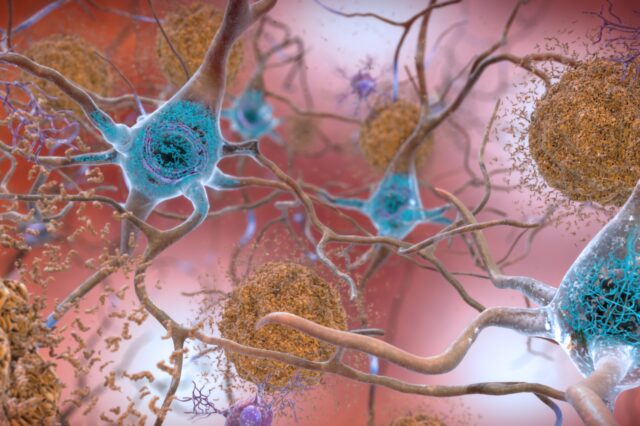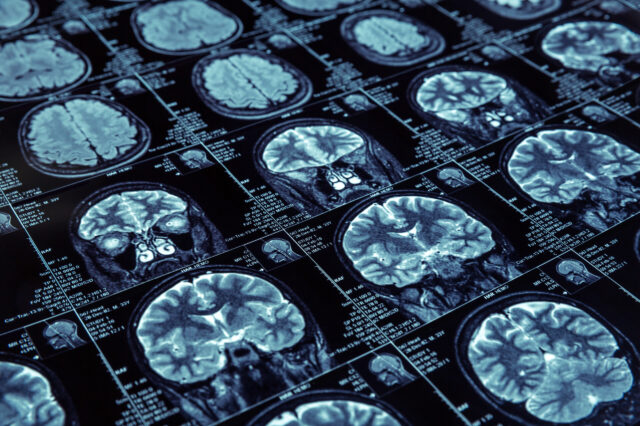- Status
- Accepting Candidates
Dementia
Definition
Dementia is a loss of brain function that occurs with certain diseases. It affects one or more brain functions such as memory, thinking, language, judgment, or behavior. Dementia may also be referred to as major neurocognitive disorder.
Alternative Names
Lewy body dementia; DLB; Vascular dementia; Mild cognitive impairment; MCI; Alzheimer disease - dementia
Causes
Dementia usually occurs in older age. Most types are rare in people under age 60. The risk of dementia increases as a person gets older.
Most types of dementia are nonreversible (degenerative). Nonreversible means the changes in the brain that are causing the dementia cannot be stopped or turned back. Alzheimer disease is the most common type of dementia.
Patient Education Video: Alzheimer disease
Another common type of dementia is vascular dementia. It is caused by poor blood flow to the brain, such as with stroke.
Lewy body disease is another cause of dementia in older adults. People with this condition have abnormal protein structures in certain areas of the brain. Any condition that results in injury to the brain can cause dementia.
The following medical conditions can also lead to dementia:
- Huntington disease
- Brain injury
- Multiple sclerosis
- Infections such as HIV/AIDS, syphilis, and Lyme disease
- Parkinson disease
- Pick disease
- Progressive supranuclear palsy
- Excess alcohol use
Some causes of dementia may be stopped or reversed if they are found soon enough, including:
- Brain injury
- Brain tumors
- Long-term (chronic) alcohol abuse
- Changes in blood sugar, sodium, and calcium levels (dementia due to metabolic causes)
- Low vitamin B12 level
- Normal pressure hydrocephalus
- Use of certain medicines, including cimetidine and some cholesterol drugs
- Some brain infections
Symptoms
Dementia symptoms include difficulty with many areas of mental function, including:
- Emotional behavior or personality
- Language
- Memory
- Perception
- Thinking and judgment (cognitive skills)
Dementia usually first appears as forgetfulness.
Mild cognitive impairment (MCI) is the stage between normal forgetfulness due to aging and the development of dementia. People with MCI have mild problems with thinking and memory that do not interfere with daily activities. They often know about their forgetfulness. Not everyone with MCI develops dementia.
Symptoms of MCI include:
- Difficulty doing more than one task at a time
- Difficulty solving problems or making decisions
- Forgetting names of familiar people, recent events, or conversations
- Taking longer to do more difficult mental activities
Early symptoms of dementia can include:
- Difficulty with tasks that take some thought, but that used to come easily, such as balancing a checkbook, playing games (such as bridge), and learning new information or routines
- Getting lost on familiar routes
- Language problems, such as trouble with the names of familiar objects
- Losing interest in things previously enjoyed, flat mood
- Misplacing items
- Personality changes and loss of social skills, which can lead to inappropriate behaviors
- Mood changes leading to aggressive behavior
- Poor performance of job duties
As dementia becomes worse, symptoms are more obvious and interfere with the ability to take care of oneself. Symptoms may include:
- Change in sleep patterns, often waking up at night
- Difficulty with basic tasks, such as preparing meals, choosing proper clothing, or driving
- Forgetting details about current events
- Forgetting events in one's own life history, losing self-awareness
- Having hallucinations, arguments, striking out, and violent behavior
- Having delusions, depression, and agitation
- More difficulty reading or writing
- Poor judgment and loss of ability to recognize danger
- Using the wrong word, not pronouncing words correctly, speaking in confusing sentences
- Withdrawing from social contact
People with severe dementia can no longer:
- Perform basic activities of daily living, such as eating, dressing, and bathing
- Recognize family members
- Understand language
Other symptoms that may occur with dementia:
- Problems controlling bowel movements or urine
- Swallowing problems
Exams and Tests
A skilled health care provider can often diagnose dementia using the following:
- Complete physical exam, including nervous system exam
- Asking about the person's medical history and symptoms
- Mental function tests (mental status examination)
Other tests may be ordered to find out if other problems may be causing dementia or making it worse. These conditions include:
- Anemia
- Brain tumor
- Long-term (chronic) infection
- Intoxication from medicines
- Severe depression
- Thyroid disease
- Vitamin deficiency
The following tests and procedures may be done:
- B12 level
- Blood ammonia level
- Blood chemistry (chem-20)
- Blood gas analysis
- Cerebrospinal fluid (CSF) analysis
- Drug or alcohol levels (toxicology screen)
- Electroencephalograph (EEG)
- Head CT
- Mental status test
- Neuropsychological test
- MRI of head
- Thyroid function tests, including thyroid stimulating hormone (TSH)
- Thyroid stimulating hormone level
- Urinalysis
Treatment
Treatment depends on the condition causing the dementia. Some people may need to stay in the hospital for a short time.
Sometimes, dementia medicine can make a person's confusion worse. Stopping or changing these medicines is part of the treatment.
Certain mental exercises can help with dementia.
Treating conditions that can lead to confusion often greatly improve mental function. Such conditions include:
- Anemia
- Decreased blood oxygen (hypoxia)
- Depression
- Heart failure
- Infections
- Nutritional disorders
- Thyroid disorders
Medicines may be used to:
- Slow the rate at which symptoms get worse, though improvement with these drugs may be small
- Control problems with behavior, such as loss of judgment or confusion
Someone with dementia will need support in the home as the disease gets worse. Family members or other caregivers can assist by helping the person cope with memory loss and behavior and sleep problems. It is important to make sure the homes of people who have dementia are safe for them.
Outlook (Prognosis)
People with MCI do not always develop dementia. When dementia does occur, it usually gets worse over time. Dementia often decreases quality of life and lifespan. Families will likely need to plan for their loved one's future care. The prognosis depends on the underlying cause. Some dementias rapidly progress to death while others can take years to get worse.
When to Contact a Medical Professional
Contact your provider if:
- Dementia develops or a sudden change in mental status occurs
- The condition of a person with dementia gets worse
- You are unable to care for a person with dementia at home
Prevention
Most causes of dementia are not preventable.
The risk of vascular dementia may be reduced by preventing strokes through:
- Eating healthy foods
- Exercising
- Quitting smoking
- Controlling high blood pressure
- Managing diabetes
Gallery


References
Knopman DS. Cognitive impairment and other dementias. In: Goldman L, Schafer AI, eds. Goldman-Cecil Medicine. 26th ed. Philadelphia, PA: Elsevier; 2020:chap 374.
Peterson R, Graff-Radford J. Alzheimer disease and other dementias. In: Jankovic J, Mazziotta JC, Pomeroy SL, Newman NJ, eds. Bradley and Daroff's Neurology in Clinical Practice. 8th ed. Philadelphia, PA: Elsevier; 2022:chap 95.
Petersen RC, Lopez O, Armstrong MJ, et al. Practice guideline update summary: mild cognitive impairment: report of the Guideline Development, Dissemination, and Implementation Subcommittee of the American Academy of Neurology. Neurology. 2018;90(3):126-135. PMID: 29282327 pubmed.ncbi.nlm.nih.gov/29282327/.
Related specialties
Aftercare and more
Clinical Trials: Dementia
UF Health research scientists make medicine better every day. They discover new ways to help people by running clinical trials. When you join a clinical trial, you can get advanced medical care. Sometimes years before it's available everywhere. You can also help make medicine better for everyone else. If you'd like to learn more about clinical trials, visit our clinical trials page. Or click one of the links below:
Community and Patient Programs: Dementia
Our community and patient programs provide great value to patients, families and loved ones. People can find support, educational materials, expert consultants and more. In most instances, these programs are offered free of charge.
-
Al'z Place
Provides adult day care for people age 18+ with Alzheimer’s disease or severe memory impairment
News and Patient Stories: Dementia
UF Health now offers drug that might slow Alzheimer’s disease
April 23, 2024
University of Florida Health is offering a new drug therapy that could temporarily slow the progression of Alzheimer’s disease in some patients. Lecanemab is…
Department of Neurology, +2 more

UF Health researchers find new method to use MRIs to delve into secrets of brain aging
April 15, 2024
GAINESVILLE — Life experience continually shapes the health of the human brain, for better or worse, like a bank receiving a lifetime of deposits and…
College of Dentistry, Institute on Aging, +2 more

Latest podcast episodes
Study suggests deep sleep might ward off dementia
There’s sleep. And then there’s sleep. After head meets pillow, the kind of slumber we experience as the clock ticks away the seconds until the alarm sounds differ and are divided into four stages....
Bilingualism might protect against dementia
Parlez-vous français? Sprechen sie Deutsch? ¿Hablas español? The bilingual among us might have a leg up on those who speak only their native tongue. German researchers in a recent study analyzed...
Sleep medicines can increase dementia risk
Prescription sleep medications may help you get more rest but can also be associated with an increased risk of dementia. That’s the primary finding by scientists at the University of California,...
